Keeping up with the Johnsons
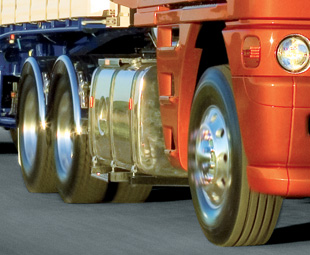
Multi Tanks International is a family-owned business that manufactures affordable high quality after-market aluminium fuel tanks for a variety of companies. FOCUS examines how they do it There are no formal job titles in this tight-knit family-owned business, but between Arthur Johnson and his two sons, Lee and Craig, the family has just over 100 years’ experience in welding – impressive by any standard. Arthur has been welding since 1957.
Multi Tanks International was officially registered in 2007, but has been welding away since 1976. “We started things under A Johnson & Sons,” says Arthur. “In around 2000, it became Multi Tanks, but it wasn’t a Closed Corporation yet.”
This 36-year history has seen the Johnsons build up irreplaceable knowledge on the specialised welding of aluminium, but their core business is the manufacturing of fuel tanks. “Tank manufacturing has been our core business for 12 years now,” says Arthur.
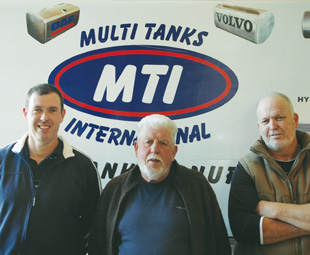 However, the Johnsons manufactured their first fuel tank 20-odd years ago for a truck distribution company. “They had aluminium chequered-plate mud guards, which you couldn’t buy in South Africa, so I started making those,” recalls Arthur. “And the trucks didn’t have aluminium tanks so I made one for the distributer as well.
However, the Johnsons manufactured their first fuel tank 20-odd years ago for a truck distribution company. “They had aluminium chequered-plate mud guards, which you couldn’t buy in South Africa, so I started making those,” recalls Arthur. “And the trucks didn’t have aluminium tanks so I made one for the distributer as well.
“Then a fellow phoned me up and said ‘I hear you are making tanks.’ He had trucks that he wanted to fit extra 350-litre tanks to. So we removed the battery box and saw that there was room for and extra tank! And we made one, which worked,” says Arthur with laughter in his voice.
Lee says this experience revealed that there was a niche in the market for fuel tank manufacturing. “Fortunately we filled it, and we just ran with it from there.” His brother Craig adds that after this they bought their first press and made a mould which they used to form the sides of the tanks.
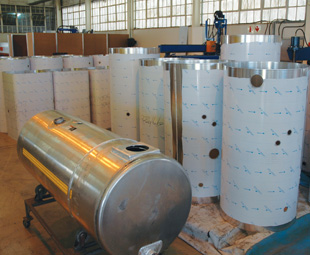 The mould collection grew as word spread, and soon the Johnsons were making fuel tanks for a variety of vehicles. “We now make fuel tanks for about 90 percent of all vehicle makes on the road,” says Craig.
The mould collection grew as word spread, and soon the Johnsons were making fuel tanks for a variety of vehicles. “We now make fuel tanks for about 90 percent of all vehicle makes on the road,” says Craig.
And Multi Tanks does this at an exceptionally low cost to its customers. “Our tanks are less than half the price of the originals,” he adds. “We don’t get a lot of our tanks back to repair – so they must be working.”
One might think that a family-owned business catering for 90 percent of the vehicle makes in the country would be a bit lacking in efficiency – but this isn’t the case with Multi Tanks. “One tank used to take us a whole day to make, but now it takes us about an hour,” says Lee.
This is due to the state-of-the-art equipment the company uses – including its presses, rollers, the computerised plasma cutter that designs can be programmed into (which is then cut within minutes), and the latest addition – a robotic welding machine that will be up and running in the near future.
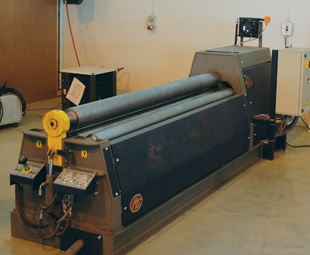 “In Europe, all the welding is robotically done, and that’s what we want to move toward,” says Arthur. He adds that the machine will deliver additional benefits. “Where it takes me about seven or eight minutes to weld the ends on a tank, the robot will do it in two and a half minutes.”
“In Europe, all the welding is robotically done, and that’s what we want to move toward,” says Arthur. He adds that the machine will deliver additional benefits. “Where it takes me about seven or eight minutes to weld the ends on a tank, the robot will do it in two and a half minutes.”
This will push Multi Tanks’ already-impressive production of 100-plus units a month even higher and broaden its market even more. “The robot will improve the look of the tanks,” Arthur says. “I’m not saying it will improve whatever we do, but the look will definitely be better because we can’t duplicate the same weld, but the machine can.
However, Lee points out that their products are already at an international level. He says they made a tank for a vehicle that went to a major manufacturer’s head office, and when it arrived, the guys couldn’t believe the tank was made in this country.
After hearing all this, it’s no surprise to learn that the company’s tanks are used all over Africa in countries such as Mozambique, Zambia, Zimbabwe, Namibia and Botswana.
Arthur points out the company doesn’t only manufacture tanks. It can make anything out of aluminium. “We make side-skirts and exhaust covers – truly anything aluminium on a truck, we can make. We have the equipment, so it wouldn’t make sense not to,” he adds, “but the manufacture of tanks is our core business now.”
And the company doesn’t just focus on fuel tanks for trucks. Its range includes bus tanks and line hauling under-belly tanks on trailers. It also manufactures customised tanks, hydraulic tanks and dual tanks – a combination of a hydraulic and diesel tank in one.
Published by
Focus on Transport
focusmagsa

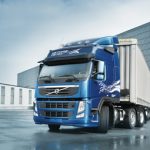


 FUSO: Driving the Future of Mobile Healthc
FUSO: Driving the Future of Mobile Healthc



 New Electric Van Range Unveiled!
New Electric Van Range Unveiled!  A brand
A brand




 Wondering about the maximum legal load for a
Wondering about the maximum legal load for a 
 The MAN hTGX powered by a hydrogen combus
The MAN hTGX powered by a hydrogen combus


 Exciting News for South African Operators
Exciting News for South African Operators






